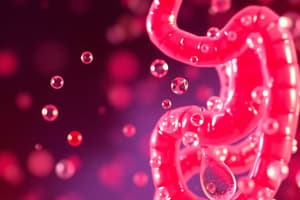Podcast
Questions and Answers
What is the primary action of antacids?
What is the primary action of antacids?
- Stimulate acid secretion
- Aid in digestion
- Buffer gastric acid (correct)
- Increase stomach acidity
Alginates are commonly used as a standalone treatment for acid secretion disorders.
Alginates are commonly used as a standalone treatment for acid secretion disorders.
False (B)
Name one common active ingredient found in antacid medications.
Name one common active ingredient found in antacid medications.
Aluminum hydroxide
Antacids raise the gastric pH to levels that are less harmful to ________ tissues.
Antacids raise the gastric pH to levels that are less harmful to ________ tissues.
Match the following antacid components with their descriptions:
Match the following antacid components with their descriptions:
What is a key example of a histamine H2-receptor antagonist?
What is a key example of a histamine H2-receptor antagonist?
Sodium alginate helps to decrease basal acid secretion.
Sodium alginate helps to decrease basal acid secretion.
What neurotransmitter is associated with the stimulation of gastrin release?
What neurotransmitter is associated with the stimulation of gastrin release?
Histamine acts on the H2-Receptor to promote _____ secretion.
Histamine acts on the H2-Receptor to promote _____ secretion.
Match the following components with their effects or roles:
Match the following components with their effects or roles:
What is the role of proton pump inhibitors in acid secretion?
What is the role of proton pump inhibitors in acid secretion?
Somatostatin decreases acid secretion by inhibiting gastrin release.
Somatostatin decreases acid secretion by inhibiting gastrin release.
Name a key example of a proton pump inhibitor.
Name a key example of a proton pump inhibitor.
Proton pump inhibitors are activated in an ________ environment.
Proton pump inhibitors are activated in an ________ environment.
Match the following components with their functions:
Match the following components with their functions:
What is the primary effect of Omeprazole?
What is the primary effect of Omeprazole?
Reflux oesophagitis is caused by the excess production of gastric acid.
Reflux oesophagitis is caused by the excess production of gastric acid.
What type of receptor do PGE2 and somatostatin primarily affect?
What type of receptor do PGE2 and somatostatin primarily affect?
NSAIDs can lead to increased acid secretion and are a common cause of __________.
NSAIDs can lead to increased acid secretion and are a common cause of __________.
Match the following compounds with their roles:
Match the following compounds with their roles:
What is the effect of histamine on the H2 receptor?
What is the effect of histamine on the H2 receptor?
A single dose of Omeprazole is effective for 2-3 days regarding acid secretion.
A single dose of Omeprazole is effective for 2-3 days regarding acid secretion.
What condition is commonly treated with proton pump inhibitors?
What condition is commonly treated with proton pump inhibitors?
Which symptom is NOT commonly associated with Reflux Oesophagitis?
Which symptom is NOT commonly associated with Reflux Oesophagitis?
Peptic stricture is a complication of Reflux Oesophagitis.
Peptic stricture is a complication of Reflux Oesophagitis.
What type of medications are proton pump inhibitors considered?
What type of medications are proton pump inhibitors considered?
H. pylori is a spiral-shaped __________ bacterium.
H. pylori is a spiral-shaped __________ bacterium.
Match the treatments with their respective conditions:
Match the treatments with their respective conditions:
What role do prostaglandins play in the gastric mucosal barrier?
What role do prostaglandins play in the gastric mucosal barrier?
NSAIDs promote the renewal of the gastric mucosal barrier.
NSAIDs promote the renewal of the gastric mucosal barrier.
What is the effect of urease produced by H. pylori?
What is the effect of urease produced by H. pylori?
Study Notes
Drugs to Treat Disorders of Acid Secretion
- Antacids are basic substances that counteract stomach acidity by buffering gastric acid, raising gastric pH.
- Examples: Aluminum hydroxide, magnesium hydroxide, calcium carbonate, magnesium carbonate (Rennie®)
- Alginates are anionic polysaccharides that form a viscous gel when combined with water.
- Examples: Sodium alginate (Gaviscon®)
- Often combined with antacids for reflux oesophagitis.
- Increases stomach content viscosity, acting as a raft to protect the oesophageal mucosa from acid reflux.
- Reduces reflux symptoms.
Physiology of Acid Secretion
- The parietal cell is the primary site of acid secretion.
- Acid secretion is regulated by:
- Acetylcholine from cholinergic nerves acting on muscarinic receptors.
- Histamine released from ECL cells acting on H2 receptors.
- Gastrin from G cells acting on gastrin receptors.
- Somatostatin from D cells inhibits acid secretion.
- Prostaglandin E2 inhibits acid secretion.
Histamine H2-Receptor Antagonists
- Examples: Famotidine
- Competitively inhibit histamine from binding to H2 receptors on parietal cells, decreasing basal and stimulated acid secretion.
Proton Pump Inhibitors (PPIs)
- Irreversibly inhibit H+/K+-ATPase, the proton pump in parietal cells, responsible for the final step in acid secretion.
- Examples: Omeprazole, Lansoprazole
- More effective than H2 receptor antagonists.
- Inactive at neutral pH.
- Accumulate in parietal cell secretory canaliculi and are activated in an acidic environment.
- A single dose affects acid secretion for 2-3 days.
Common Conditions Requiring Treatment of Excess Acid Secretion
- Reflux Oesophagitis: Inflammation of the lower oesophagus caused by gastro-oesophageal reflux disease (GORD).
- Symptoms: Heartburn, regurgitation, haematemesis
- Complications: Oesophageal ulceration, peptic stricture, Barrett's oesophagus
- Treatment: Antacids, alginates, H2 receptor antagonists, PPIs.
- Peptic Ulcer:
- Causes:
- NSAID use: NSAIDs impair gastric mucosal barrier renewal by inhibiting prostaglandin production.
- H. pylori infection: Helicobacter pylori infection damages stomach and duodenal tissue.
- Causes:
Prostaglandins
- Function: Involved in healing processes, inflammation, and blood flow.
- Synthesis: Derived from arachidonic acid, catalyzed by cyclooxygenase (COX) enzymes.
- NSAID action: NSAIDs inhibit COX enzymes, reducing prostaglandin synthesis.
- Gastric Mucosal Barrier: Prostaglandins stimulate gastric mucus production, bicarbonate secretion, inhibit acid production, and promote tissue repair.
Helicobacter pylori Infection
- Characteristics: Spiral-shaped, Gram-negative bacterium that damages stomach and duodenal tissue.
- Action: Produces urease, which breaks down urea to ammonia (NH3); NH3 neutralizes gastric acid.
- Mechanism of Damage:
- Penetrates mucus barrier, facilitating acid penetration.
- NH3, other bacterial products, and acid damage epithelial cells.
- Treatment: Antibiotics (e.g., Amoxicillin, Clarithromycin) and PPIs (e.g., Lansoprazole).
- Outcome: Eradication of H. pylori can lead to long-term remission of ulcers.
Studying That Suits You
Use AI to generate personalized quizzes and flashcards to suit your learning preferences.
Related Documents
Description
This quiz covers key drugs used to treat acid secretion disorders, including antacids and alginates. You'll learn about their mechanisms, examples, and how they alleviate symptoms such as acid reflux. Perfect for students of pharmacology looking to deepen their understanding of gastrointestinal treatments.




